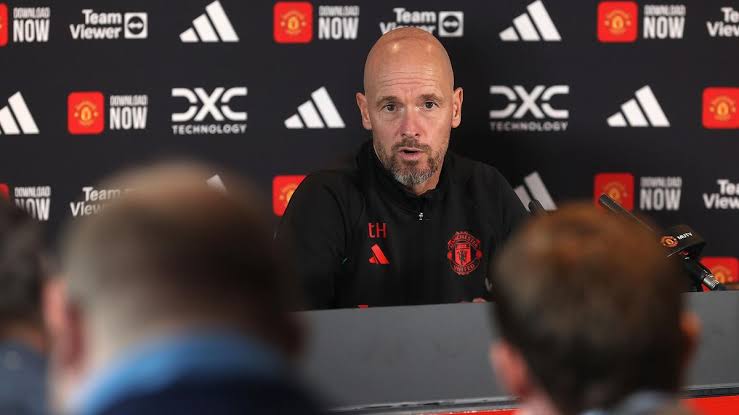Erik ten Hag, Manchester United’s head coach, recently shed light on his decision to substitute Marcus Rashford at halftime during their Europa League clash with FC Porto on Thursday. The move left many fans and pundits puzzled, especially given Rashford’s impressive performance in the first half. Despite his recent struggles with form, Rashford seemed to rediscover his rhythm during the match, scoring the opening goal and setting up another for Rasmus Hojlund. Yet, to the shock of many, Rashford did not return for the second half.
Rashford had been one of United’s standout players in the first half, causing constant problems for Porto’s defense, particularly for their full-back Joao Mario. His goal, which came early on, was the result of his excellent movement on the left wing, where he repeatedly outpaced and outmaneuvered his marker. Beyond his goal, Rashford played a crucial role in United’s second, assisting Hojlund with a perfectly timed pass that put United in a commanding position. His performance seemed to suggest that he was finally getting back to his best after a difficult spell.
However, just as United looked to capitalize on their early dominance, Ten Hag made the surprising decision to replace Rashford with Alejandro Garnacho at the interval. Given how influential Rashford had been, many assumed that the substitution was due to an injury or fitness concern. As the second half unfolded and Rashford remained on the bench, speculation grew, with many questioning whether Ten Hag had made a tactical blunder by withdrawing one of his most dangerous players.
After the match, Ten Hag faced the media, and one of the first questions he was asked was about his decision to take off Rashford. Speaking to TNT Sports, Ten Hag explained that the decision was part of a pre-planned rotation strategy aimed at managing the squad’s fitness ahead of their next fixture. “We need to rotate,” Ten Hag stated firmly. “We wanted to get Garnacho on the pitch. We have a quick turnaround with the game at Aston Villa coming up, and we need fresh legs for Sunday.”
When pressed further on whether Rashford could have played more minutes given his performance, Ten Hag reiterated his stance on rotation. “We must play Garnacho,” he emphasized. “With the Villa game just around the corner, they have an extra day to rest, and it’s an away match for us. So, it’s important we keep our players fresh for these quick turnarounds.”
Ten Hag’s comments may have offered a practical explanation, but they did little to ease the frustration of many United supporters who had been vocal on social media. For many, Rashford had been the standout player on the pitch, and taking him off seemed to halt United’s momentum. One fan took to social media to express their disbelief, writing, “Marcus Rashford was the most menacing player on the pitch, and Porto couldn’t handle him when he had the ball. Ten Hag subbed him off just because of a rotation plan? Unbelievable!”
The decision to substitute Rashford quickly became one of the main talking points following the match, especially given the impact Rashford had made in the first half. For a player who had struggled to find his form in recent weeks, his performance against Porto appeared to signal a return to his best, only for his evening to be cut short by a pre-planned strategy. Many fans and pundits alike questioned whether the rotation was truly necessary, particularly in a match where United were in need of a win.
The substitution of Rashford, coupled with the decision to bring on Garnacho, also sparked discussions about Ten Hag’s broader tactics and approach to squad management. While the need for rotation is clear given the packed fixture schedule, some argued that players like Rashford, who thrive on confidence and momentum, should be given more time on the pitch, especially when they are playing well. Forwards, in particular, often need game time to maintain their rhythm, and pulling Rashford off at halftime may have interrupted his flow at a critical moment.
In the aftermath of the match, Ten Hag’s explanation was met with mixed reactions. Some supporters understood the need to manage the squad ahead of what promises to be a busy period of fixtures, but others remained unconvinced, feeling that Rashford’s performance warranted more minutes. The substitution, while seemingly minor in the grand scheme of things, highlighted the fine balance that managers like Ten Hag must strike between managing player fitness and maintaining a winning momentum.
As Manchester United prepare for their next game against Aston Villa, all eyes will be on Ten Hag’s team selection. Will Rashford return to the starting lineup, or will Garnacho be given another chance to impress? And perhaps more importantly, will the decision to rotate key players ultimately pay off in the long run? These are the questions United fans will be asking as the team navigates a crucial stretch of the season.
In conclusion, Ten Hag’s decision to substitute Marcus Rashford at halftime against Porto has sparked debate among fans and pundits alike. While the manager’s explanation points to the need for squad rotation, many believe that Rashford, given his impressive first-half performance, should have been allowed to continue. As the season progresses, how Ten Hag manages his squad in these crucial moments will be key to United’s success, particularly when it comes to getting the best out of players like Rashford, who can make the difference on
the biggest stages.
